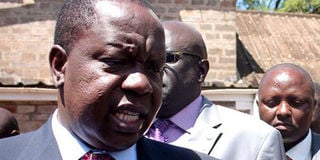Why candidates failed 2017 KCSE tests en masse — examiners

Education Cabinet Secretary Fred Matiang’i speaks about the 2017 Kenya Certificate of Secondary Education examination results at Nairobi School on December 20, 2017. He said the ministry was determined to ensure that every child accesses relevant reading and learning materials. PHOTO | DENNIS ONSONGO | NATION MEDIA GROUP
What you need to know:
- In their report, examiners noted that most answers to questions requiring elaborate responses were inadequate.
- Dr Matiang’i said pointed out that many candidates relied heavily on sketchy revision books and past papers during their revision.
The mass failure by candidates in last year’s Kenya Certificate of Secondary Education (KCSE) examination has been attributed to misunderstanding of questions.
In their report, examiners noted that most answers to questions requiring elaborate responses were inadequate.
“The examiners reported that some of the questions that tested candidates’ ability to DISCUSS or EXPLAIN certain concepts that they had learnt were poorly answered, with many candidates either listing or providing sketchy answers,” Education Cabinet Secretary Fred Matiang’i said during the release of the results at Nairobi School on Wednesday.
Dr Matiang’i said although the ministry and the Kenya National Examinations Council have yet to carry out an elaborate assessment to find out the reasons for the poor response to these type of questions, examiners had pointed out that many candidates relied heavily on sketchy revision books and past papers during their revision.
Such revision books and past papers don’t contain detailed explanations.
REASONS
A report on the 2014, 2015 and 2016 KCSE examination released by the ministry of Education this year identified use of sheng (colloquial language), failure to follow instructions, poor time management and rush to answer questions before understanding them, as some of the reasons for failure by students.
It also found out that some students were failing because of inadequate language skills.
“With the government’s plan to supply textbooks directly to schools, candidates should be adequately prepared to answer questions in all areas appropriately,” Dr Matiang’i noted.
TEXTBOOKS
He said the ministry was determined to ensure that every child accesses relevant reading and learning materials.
“For this reason, the ministry has come up with a direct-to-school policy on book distribution that will ensure our public schools attain the 1:1 book ratio.
"This will also eliminate middle men who collude with corrupt school officials to steal from the government and our children.
"Because textbooks will bear the “Not-for-Sale” label, this policy will help us to curb piracy, which has cost the government billions of shillings in revenue,” the CS said.





